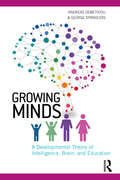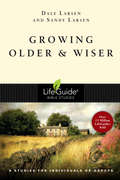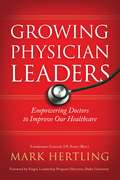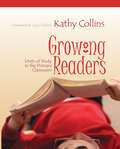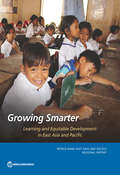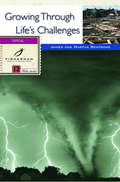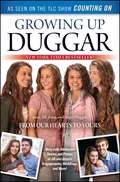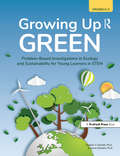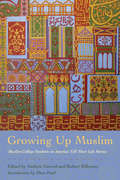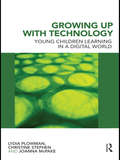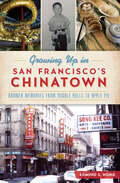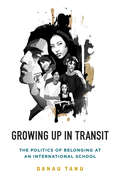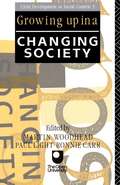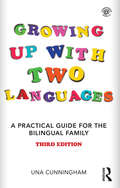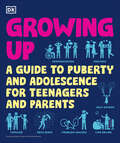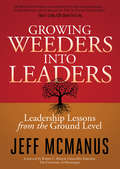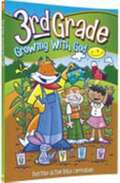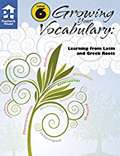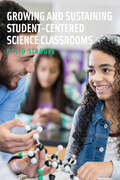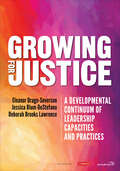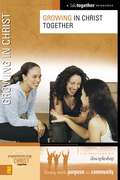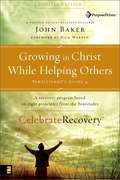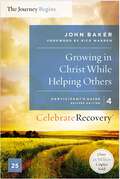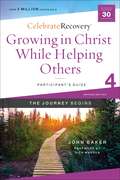- Table View
- List View
Growing Minds: A Developmental Theory of Intelligence, Brain, and Education
by Andreas Demetriou George SpanoudisInterest in the human mind is a centuries-old fascination, dating back to Plato, Aristotle, and Descartes. While the theories proposed about the human mind have since advanced and evolved, the fascination remains. Growing Minds is a unique and interdisciplinary work that guides the reader through an examination of the human mind's nature, performance, lifespan, and variations. The book sets out to answer a variety of questions: What are the cognitive processes underlying intelligence? What is general and what is specific in intelligence? What is stable and what is changing in intelligence as children grow older? Why do individuals differ in intelligence, and are differences genetically determined? How is intelligence and intellectual development related to the genome and the brain? How is intelligence related to personality? Can intelligence be enhanced by specific interventions? The text is organised into three parts: the first provides a summary and evaluation of research conducted on the human mind by experimental cognitive psychology, differential psychology, and developmental psychology. The second presents an overarching theory of the growing mind, showing how mind and intelligence are at the crossroads of nature and nurture; and the third assesses the relationship between education and intelligence. This book is the result of decades of extensive research and culminates in the proposal of a new overarching and integrated theory of the developing mind. For the first time, research is gathered and combined to form a comprehensive concept and fulfil the need for a fresh, integrative paradigm which both asks and answers questions about the human mind from a multi-faceted perspective.
Growing Older and Wiser: 9 Studies For Individuals Or Groups (LifeGuide Bible Studies)
by Sandy Larsen Dale Larsen®PDF download with a single-user license; available from InterVarsity Press and other resellers.
Growing Physician Leaders: Empowering Doctors to Improve Our Healthcare
by Mark HertlingCan a general teach America’s doctors to be better leaders?Hospitals, clinics, and healthcare organizations across the nation are wondering, “Can we transform healthcare by improving physician leadership? And if so, how?” Healthcare today faces both daunting challenges and exciting new possibilities. Physicians hold the key to improving healthcare, but while they enjoy exceptional training in the science of medicine, the vast majority of doctors have received little training in even the basics of leadership.In Growing Physician Leaders, retired Army Lieutenant General Mark Hertling applies his four decades of military leadership to the world of healthcare, resulting in a profoundly constructive and practical book with the power to reshape and reenergize any healthcare organization in America today. Designed to help physicians master the art of leading people, it takes them, step-by-step, through a proven process that can help anyone become a more effective leader.Growing Physician Leaders gives doctors a potent tool to improve their personal health, their professional health, their organizational health, and ultimately, our nation’s health.
Growing Readers: Units of Study in the Primary Classroom
by Kathy CollinsPrimary-grade teachers face an important challenge: teaching children how to read while enabling them to build good habits so they fall in love with reading. Many teachers find the independent reading workshop to be the component of reading instruction that meets this challenge because it makes it possible to teach the reading skills and strategies children need and guides them toward independence, intention, and joy as readers. In Growing Readers, Kathy Collins helps teachers plan for independent reading workshops in their own classrooms. She describes the structure of the independent reading workshop and other components of a balanced literacy program that work together to ensure young students grow into strong, well-rounded readers. Kathy outlines a sequence of possible units of study for a yearlong curriculum. Chapters are devoted to the individual units of study and include a sample curriculum as well as examples of mini-lessons and reading conferences. There are also four “Getting Ready” sections that suggest some behind-the-scenes work teachers can do to prepare for the units. Topics explored in these units include:print and comprehension strategies;reading in genres such as poetry and nonfiction;connecting in-school reading and out-of-school reading;developing the strategies and habits of lifelong readers. A series of planning sheets and management tips are presented throughout to help ensure smooth implementation. We want our students to learn to read, and we want them to love to read. To do this we need to lay a foundation on which children build rich and purposeful reading lives that extend beyond the school day. The ideas found in Growing Readers create the kind of primary classrooms where that happens.
Growing Smarter: Learning and Equitable Development in East Asia and Pacific (World Bank East Asia and Pacific Regional Report)
by World BankOne-quarter of the world’s school-age children live in East Asia and Pacific. During the past 50 years, some economies in the region have successfully transformed themselves by investing in the continuous upgrading of the knowledge, skills, and abilities of their workforce. Through policy foresight, they have produced graduates with new levels of knowledge and skills almost as fast as industries have increased their demand for skilled workers. Yet the success of these high-performing systems has not been replicated throughout the region. Tens of millions of students are in school but not learning, and as many as 60 percent of students remain in school systems that are struggling to escape from the global learning crisis or in systems where performance is likely poor. Many students in these systems fail to reach basic levels of proficiency in key subjects and are greatly disadvantaged because of it. Growing Smarter: Learning and Equitable Development in East Asia and Pacific focuses on the experiences of economies in the region that have been able to expand schooling and learning and showcases those that have managed to pursue successful education reforms at scale. By examining these experiences, the report provides both diagnoses and detailed recommendations for improvement not only for education systems within East Asia and Pacific but also for countries across the globe. In East Asia and Pacific, the impressive record of success in education in some low- and middle-income countries is proof of concept that schooling in resource-constrained contexts can lead to learning for all. This report identifies the policies and practices necessary to ensure that students learn and suggests how countries can improve learning outcomes.
Growing Through Life's Challenges
by James Reapsome Martha ReapsomeHelp for Life's Struggles from Bible Heroes Who've Been There. Throughout Scripture, we see evidence that God's people faced the same challenges we do today. From rejection to depression, facing overwhelming responsibilities to wrestling with doubts, these heroes of the faith shared the pain, frustration, and hopes that are common to modern day believers. By observing how biblical characters like Moses, Joshua, Daniel, Peter, and Paul, brought their fears and frustrations to God, we can learn to do the same. Filled with encouragement and hope, this study will convince you that God's character and presence can give you strength to face any difficulty. 10 studies for individuals or groups.
Growing Up Duggar
by Jessa Duggar Jill Duggar Jana Duggar Jinger DuggarIt's All About Relationships! In this delightful and very personal book, the four oldest Duggar girls share their hearts and their core beliefs, explaining that it's all about relationships! * Relationship with self: The girls share their own personal journeys to self-acceptance and navigating the difficult stage of adolescence. * Relationship with parents: You'll find revelations about how Jim Bob and Michelle keep the lines of communication open with their children. * Relationships with siblings: Here, you'll get a peek into the Buddy system, how the siblings handle conflict, and how the loss of little Jubilee (their sister) affected their relationships with each other. * Relationships with friends: You'll find principles on how the Duggar kids deal with peer pressure and how they interact with friends outside their family. * Relationships with boys: You'll learn the Duggar view of dating and courtship, and these four sisters will address the often-asked question of when one of them will get married. * Relationship with God: And woven throughout the book, the girls talk about their most important relationship of all--their relationship with God and their own personal faith and beliefs. This candid look into what Jana, Jill, Jessa, and Jinger believe and why they believe it will give you practical insights into your own life and will inspire you to evaluate principles that will work for you.
Growing Up Green: Problem-Based Investigations in Ecology and Sustainability for Young Learners in STEM (Grades K-2)
by Stephen T. Schroth Janese DanielsGrowing Up Green allows young students (grades K-2) to build critical and creative thinking skills, while also improving skills in science, technology, engineering, and mathematics (STEM). The book:Includes 10 problem-based investigations that explore sustainability and environmental concerns.Covers topics such as reducing one's carbon footprint, developing green manufacturing processes, initiating a recycling program, and more.Is perfect for general education classrooms, single- or multi-grade gifted classrooms, or pull-out programs.Features crosscurricular connections.Includes a list of apps, websites, and books that can be used to increase students' understanding and curiosity.Each investigation includes comprehensive teacher instructions, ideas for differentiation, hands-on student activities, reproducible student resources, reflection opportunities, and assessment options. The engaging investigations guide learners through the process of identifying problems, developing research questions, gathering and analyzing data, developing possible solutions, and disseminating information to others.Grades K-2
Growing Up Muslim: Muslim College Students in America Tell Their Life
by Andrew Garrod Robert Kilkenny Eboo Patel"While 9/11 and its aftermath created a traumatic turning point for most of the writers in this book, it is telling that none of their essays begin with that moment. These young people were living, probing, and shifting their Muslim identities long before 9/11. . . . I've heard it said that the second generation never asks the first about its story, but nearly all the essays in this book include long, intimate portrayals of Muslim family life, often going back generations. These young Muslims are constantly negotiating the differences between families for whom faith and culture were matters of honor and North America's youth culture, with its emphasis on questioning, exploring, and inventing one's own destiny. "--from the Introduction by Eboo Patel In Growing Up Muslim, Andrew Garrod and Robert Kilkenny present fourteen personal essays by college students of the Muslim faith who are themselves immigrants or are the children of immigrants to the United States. In their essays, the students grapple with matters of ethnicity, religious prejudice and misunderstanding, and what is termed Islamophobia. The fact of 9/11 and subsequent surveillance and suspicion of Islamic Americans (particularly those hailing from the Middle East and the Asian Subcontinent) have had a profound effect on the lives of these students. The shift in official policies and everyday habits that occurred subsequent to the attacks on New York and Washington D. C. has had an influence on the lives of these undergraduates, their families, and their communities of origin.
Growing Up With Technology: Young Children Learning in a Digital World
by Christine Stephen Lydia Plowman Joanna McPakeGrowing Up with Technology explores the role of technology in the everyday lives of three- and four-year-old children, presenting the implications for the children’s continuing learning and development. Children are growing up in a world where the internet, mobile phones and other forms of digital interaction are features of daily life. The authors have carefully observed children’s experiences at home and analysed the perspectives of parents, practitioners and the children themselves. This has enabled them to provide a nuanced account of the different ways in which technology can support or inhibit learning. Drawing on evidence from their research, the authors bring a fresh approach to these debates, based on establishing relationships with children, families and educators to get insights into practices, values and attitudes. A number of key questions are considered, including: Which technologies do young children encounter at home and preschool? What kind of learning takes place in these encounters? How can parents and practitioners support this learning? Are some children disadvantaged when it comes to learning with technology? Growing Up with Technology is strongly grounded in a series of research projects, providing new ways of thinking about how children’s learning with technology can be supported. It will be of great interest to undergraduate and postgraduate students on a range of courses including childhood studies, and those with a particular interest in the use of technology in education. Parents, practitioners and researchers will also find this a fascinating and informative read.
Growing Up in San Francisco's Chinatown: Boomer Memories from Noodle Rolls to Apple Pie
by Edmund S WongChinese American baby boomers who grew up within the twenty-nine square blocks of San Francisco's Chinatown lived in two worlds. Elders implored the younger generation to retain ties with old China even as the youth felt the pull of a future sheathed in red, white and blue. The family-owned shops, favorite siu-yeh (snack) joints and the gai-chongs where mothers labored as low-wage seamstresses contrasted with the allure of Disney, new cars and football. It was a childhood immersed in two vibrant cultures and languages, shaped by both. Author Edmund S. Wong brings to life Chinatown's heart and soul from its golden age.
Growing Up in Transit: The Politics of Belonging at an International School
by Danau TanuIn this compelling study of the children of serial migrants, Danau Tanu argues that the international schools they attend promote an ideology of being "international" that is Eurocentric. Despite the cosmopolitan rhetoric, hierarchies of race, culture and class shape popularity, friendships and romance on campus. By going back to high school for a year, Tanu befriended transnational youth, often called "Third Culture Kids", to present their struggles with identity, belonging and internalized racism in their own words. The result is the first engaging, anthropological critique of the way Western-style cosmopolitanism is institutionalized as cultural capital to reproduce global socio-cultural inequalities.
Growing Up in a Changing Society (Child Development in Social Context)
by Martin Woodhead Ronnie Carr Paul LightFirst published in 1991. Routledge is an imprint of Taylor & Francis, an informa company.
Growing Up with Two Languages: A Practical Guide for the Bilingual Family
by Una CunninghamThe lives of many families involve contact with more than one language and culture on a daily basis. Growing Up with Two Languages is aimed at the many parents and professionals who feel uncertain about the best way to go about helping children gain maximum benefit from the multilingual situation. This best-selling guide is illustrated by glimpses of life from interviews with fifty families from all around the world. The trials and rewards of life with two languages and cultures are discussed in detail, and followed by practical advice on how to support the child’s linguistic development. Features of this third edition include: a dedicated website with new and updated Internet resources a new chapter giving the perspective of adults who have themselves grown up with more than one language a new chapter presenting research into bilingual language acquisition with information about further reading new and updated first-hand advice and examples throughout. Una Cunningham is an Associate Professor in Modern Languages at Stockholm University, Sweden. She and her husband, Staffan Andersson, have raised their four children to speak English and Swedish in Sweden.
Growing Up: A Teenager's and Parent's Guide to Puberty and Adolescence (DK Help Your Kids)
by DKDeal with the ups and downs of growing up. This visual guide to puberty and adolescence is a must-read for all parents and tweens embarking on those scary teenage years. This growing up book covers contemporary issues such as internet safety and tackles key topics such as sexuality and body image. Demystify puberty with this must-read home reference book. From your menstrual cycle to sexting, and even cyber-bullying.This straightforward, unpatronizing approach to tricky topics is the essential illustrated guide to adolescence for both parents and their teens. The stunning graphics and illustrations make this invaluable for tweens and teens alike.Help Your Kids With Adolescence is a guide for modern kids coming into their teen years. It addresses topical issues like body image, the effects of social media, and sexting. It also offers a biological explanation for the physical side of being a teenager from mood swings, periods, and breaking voices. This book offers a no-nonsense, non-judgemental approach to help parents and their kids navigate their way through puberty and adolescence. Sexuality, Confidence, Social Media, Emotions, Stress!Puberty and adolescence can be a confusing and complex time. Help Your Kids With Adolescence offers straightforward advice to help parents and children survive and thrive during the turbulent teenage years. Emotional well-being, physical changes, online safety, family dynamics, relationships, sexuality, and much more are discussed and explained through jargon-free text and simple, clear illustrations. Engaging graphics and illustrations make this modern, comprehensive guide to adolescence invaluable for tweens and teens alike. Whether as a quick-reference guide or cover-to-cover read.This self-understanding and self-development book will discuss and explain the following topics:- Growing Up- Female Puberty- Male Puberty- Healthy Body- Healthy Mind- Achieving Potential - Digital Life- Sexuality- Relationships - And more.DK's bestselling Help Your Kids With series contains crystal-clear visual breakdowns of important subjects. Simple graphics and jargon-free text are key to making this series a user-friendly resource for frustrated parents who want to help with children get the most out of life. Get help with anything from geography and music to maths, SATs, and growing up.
Growing Weeders Into Leaders: Leadership Lessons from the Ground Level
by Jeff McManusOne of America&’s most accomplished landscaping professionals reveals his methods for cultivating greatness. Nowadays, greatness tends to be measured by shortest or longest times, highest heights, medals won, honors given. But as Aristotle taught us, greatness is what we can do every day, without recognition or reward, for the satisfaction that comes from meeting the challenge, creating a team, and overcoming the odds. Under Jeff McManus&’s leadership as Director of Landscape Services, the Ole Miss campus has won professional awards—and been cited by Newsweek and Princeton Review as America&’s &“most beautiful campus.&” In Growing Weeders into Leaders, he relates the principles behind his team&’s success. It is an entertaining and thoughtful look into the hearts and the workday lives of ordinary people who tapped into their inner greatness in pursuit of a vision. Creating one of America&’s most beautiful college campuses at the University of Mississippi did not happen overnight and, inside these pages, McManus describes the joys, the defeats, the brilliant problem-solving and the best laid plans that are proven worthless . . . until the bigger picture appears. This is the bigger picture as viewed from the ground level—taking you through the practical applications of empowering people to experience not only what it means to grow outstanding landscapes, but also to grow greatness in themselves and encourage it in others. &“A straightforward approach to problem-solving and methods to grow individuals into a team.&” —Susanne Woodell, CGM Historic Gardens Manager, Biltmore
Growing With God: Student Manual
by Positive Action for ChristTeaches students about God through the stories and activities centered around the lives of major Bible characters. Designed to challenge the student's heart and head.
Growing Your Vocabulary: Learning from Latin and Greek Roots - Book C
by Prestwick House IncFormally known as Growing Your Vocabulary: Learning from Latin and Greek Roots Book C. Students need to develop the skills to improve their vocabulary, not only because state standards require it, but because nothing will make students better readers and communicators than having the ability to understand new words. With over half a million of our vocabulary books in schools nationwide, Prestwick House has been well-known for years as the #1 source for the absolute best vocabulary programs. Now we're bringing our award-winning expertise to students in 4th-6th grade. <P><P>The twenty lessons in each book are designed to get students actively thinking about how words are formed by using interesting notes on the vocabulary words' origins, definitions, and use in sentences. Each lesson has a full week's worth of activities and exercises that will help students not only remember the definitions of new words but also put what they have learned into practice through creative writing assignments and fun games. Every chapter also includes an exercise that will help students learn to experiment with language by building new words from known roots or breaking down unfamiliar words, giving them invaluable practice in using their newly acquired root word knowledge. Synonym and antonym usage is plentiful, and out hilarious cartoons will reinforce what students have learned. Recommended for sixth grade. This is a student classroom edition.
Growing and Sustaining Student-Centered Science Classrooms
by David StroupeA wealth of practical tools and guidance for rooting out injustice and creating science learning spaces in which students feel valued, safe, and eager to engage.In Growing and Sustaining Student-Centered Science Classrooms, David Stroupe promotes powerful conversation and action around knowledge-building practices in science education. The book takes readers into inspiring classroom communities in which all students are invited and encouraged to engage in the work of science. An illuminating series of real-time classroom scenes demonstrate flexible teaching approaches and instructional pivots that Stroupe calls talk moves and shows how they foster inclusive collaboration and participation to create a more expansive, and better, version of science education.Even as Stroupe champions student-centered science education, he acknowledges that common obstructions to knowledge sharing, or epistemic injustices, can often prevent this student-led ideal from materializing. He calls attention to four types of injustices that frequently stifle student voice and access in science learning communities: testimonial injustice, hermeneutical injustice, intrapersonal injustice, and hierarchical injustice. Recounting real-life examples of these individual and systemic injustices, Stroupe gives educators the tools to both identify and eradicate them.This thought-provoking book sets forth ambitious tactics for educators to audit assumptions and biases in science, promote student agency, and conduct action research to document change. Using Stroupe's accessible methods, teachers, teacher educators, and administrators can design immediate and long-term instructional practices to disrupt injustices in STEM classroom communities and support student learning.
Growing for Justice: A Developmental Continuum of Leadership Capacities and Practices
by Eleanor Drago-Severson Jessica Blum-DeStefano Deborah Brooks LawrenceBe the leader you want to see in the world. Educators committed to social justice enter into the work in markedly different ways. Drawing from research with 50 educational leaders from across the United States, Growing for Justice explores how leaders committed to social justice support the growth of others while also developing their own capacities to engage, connect, and lead for change. This groundbreaking book, informed by adult developmental theory and based on a first-of-its-kind study, helps school leaders assess their own strengths and areas for growth—and then take concrete steps toward improvement. Features include: Exploration of meaning-making systems and how they affect leaders’ understandings of diversity, equity, and social justice A research-based, developmental model of justice-centering educational leadership capacities and practices Leaders’ personal stories of growth and development as advocates Planning activities and reflective exercises to drive decision-making, action, and internal capacity-building Wherever you are in your social justice journey, wanting to do better is the first step toward actually doing better. With this book’s help, you’ll outline the supports, stretches, and scaffoldings you need to continually grow for justice.
Growing for Justice: A Developmental Continuum of Leadership Capacities and Practices
by Eleanor Drago-Severson Jessica Blum-DeStefano Deborah Brooks LawrenceBe the leader you want to see in the world. Educators committed to social justice enter into the work in markedly different ways. Drawing from research with 50 educational leaders from across the United States, Growing for Justice explores how leaders committed to social justice support the growth of others while also developing their own capacities to engage, connect, and lead for change. This groundbreaking book, informed by adult developmental theory and based on a first-of-its-kind study, helps school leaders assess their own strengths and areas for growth—and then take concrete steps toward improvement. Features include: Exploration of meaning-making systems and how they affect leaders’ understandings of diversity, equity, and social justice A research-based, developmental model of justice-centering educational leadership capacities and practices Leaders’ personal stories of growth and development as advocates Planning activities and reflective exercises to drive decision-making, action, and internal capacity-building Wherever you are in your social justice journey, wanting to do better is the first step toward actually doing better. With this book’s help, you’ll outline the supports, stretches, and scaffoldings you need to continually grow for justice.
Growing in Christ (Experiencing Christ Together)
by Brett Eastman Dee EastmanOur world these days is so hectic, so complex. Where do we turn for wisdom and guidance in navigating the ins and outs of life? There are many voices to listen to and many examples to follow, but we really need look no further than the Author of Life, Jesus. He taught and lived a way of life that was purposeful and pleasing to God. These six sessions will show you the value and the nature of a life of discipleship, as modeled by Jesus.Experiencing Christ Together helps your group explore the five biblical purposes that make up a high-impact Christian life —fellowship, discipleship, ministry, evangelism, and worship. Jesus perfectly lived out God’s purposes for his life, and he taught his followers how to do the same. As you walk in the footsteps of those first disciples by listening to and watching Jesus through these studies, you and your group will be transformed. One small group leader put it this way: “The Experiencing Christ Together series has motivated me more than any other Bible study that I have ever been to. This Bible study gets to the heart of the matter—my character in Christ—and that has created action on my part.”
Growing in Christ While Helping Others Participant's Guide 4
by John BakerA Program for Implementing a Christ-Centered Recovery Ministry in Your Church Alcoholism - Divorce - Sexual Abuse - Codependency - Domestic Violence - Drug Addiction - Sexual Addiction - Food Addiction - Gambling Addiction and many more! There is a way the church can help the hurting move beyond their wounds to experience the healing and forgiveness of Christ. Since 1991, more than 200,000 people have participated in the Celebrate Recovery programs offered at more than 3,500 churches, prisons, and rescue missions. Drawn from the Beatitudes, Celebrate Recovery helps people resolve painful problems in the context of the church as a whole. Newly updated, the kit includes: •1 20-minute DVD introductory guide for leaders •1 leader’s guide •1 of each participant’s guide (4 total) •CD-ROM with 25 lessons •CD-ROM with sermon transcripts and reproducible promotional materials •4-volume audio CD sermon series “And then there’s pastor John Baker, the founder of Celebrate Recovery… Big John and I shared something in common. We used to drink too much. And our hearts changed, and then we quit. That is a tried-and-true formula. The problem is government is not good at changing hearts. But people like John Baker have been good about it and successful doing that.” —President George W. Bush on Celebrate Recovery and its founder, John Baker, at the Faith- Based and Community Initiatives Conference, March 3, 2004.
Growing in Christ While Helping Others Participant's Guide 4: A Recovery Program Based on Eight Principles from the Beatitudes (Celebrate Recovery)
by John BakerThe Celebrate Recovery Participant&’s Guides are essential tools for the personal recovery journey. In the seven lessons in Guide 4: Growing in Christ While Helping Others, you will work through the final two principles on the road to recovery. More than just maintenance, these principles will help you prevent relapse and give you the necessary tools to help others in their recovery process.8 Reserve a daily time with God for self-examination. Bible reading and prayer in order to know God and his will for my life and to gain the power to follow his will.9 Yield myself to God to be used to bring this Good News to others, both by my example and by my words. "Happy are those who are persecuted because they do what God requires" (Matthew 5:10).By working through the lessons and exercises found in each of the four Participant&’s Guides you will begin to experience the true peace and serenity you have been seeking, restore and develop stronger relationships with others and with God, and find freedom from life&’s hurts, hang-ups, and habits.All the scriptures have been updated to the new NIV 2011 version.
Growing in Christ While Helping Others Participant's Guide 4: A Recovery Program Based on Eight Principles from the Beatitudes (Celebrate Recovery)
by John BakerThe Celebrate Recovery Participant's Guides are essential tools for the personal recovery journey. In the seven lessons in Guide 4: Growing in Christ While Helping Others, you will work through the final two principles on the road to recovery. More than just maintenance, these principles will help you prevent relapse and give you the necessary tools to help others in their recovery process.7 Reserve a daily time with God for self-examination. Bible reading and prayer in order to know God and his will for my life and to gain the power to follow his will.8 Yield myself to God to be used to bring this Good News to others, both by my example and by my words. "Happy are those who are persecuted because they do what God requires" (Matthew 5:10).By working through the lessons and exercises found in each of the four Participant's Guides you will begin to experience the true peace and serenity you have been seeking, restore and develop stronger relationships with others and with God, and find freedom from life's hurts, hang-ups, and habits. All the scriptures have been updated to the new NIV 2011 version.
